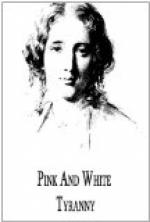“Lillie always did know exactly what she wanted: she’s a smart little thing.”
And, when all the trying on and arranging of folds and frills and pinks and bows was over, Lillie threw herself comfortably upon the bed, to finish her letter.
Shrewd Miss Clippins detected the yawn with which she laid down the missive.
[Illustration: “Shrewd Miss Clippins detected the yawn.”]
“Seems to me your letters don’t meet a very warm reception,” she said.
“Well! every day, and such long ones!” Lillie answered, turning over the pages. “See there,” she went on, opening a drawer, “What a heap of them! I can’t see, for my part, what any one can want to write a letter every day to anybody for. John is such a goose about me.”
“He’ll get over it after he’s been married six months,” said Miss Clippins, nodding her head with the air of a woman that has seen life.
“I’m sure I shan’t care,” said Lillie, with a toss of her pretty head. “It’s borous any way.”
Our readers may perhaps imagine, from the story thus far, that our little Lillie is by no means the person, in reality, that John supposes her to be, when he sits thinking of her with such devotion, and writing her such long, “borous” letters.
She is not. John is in love not with the actual Lillie Ellis, but with that ideal personage who looks like his mother’s picture, and is the embodiment of all his mother’s virtues. The feeling, as it exists in John’s mind, is not only a most respectable, but in fact a truly divine one, and one that no mortal man ought to be ashamed of. The love that quickens all the nature, that makes a man twice manly, and makes him aspire to all that is high, pure, sweet, and religious,—is a feeling so sacred, that no unworthiness in its object can make it any less beautiful. More often than not it is spent on an utter vacancy. Men and women both pass through this divine initiation,—this sacred inspiration of our nature,—and find, when they have come into the innermost shrine, where the divinity ought to be, that there is no god or goddess there; nothing but the cold black ashes of commonplace vulgarity and selfishness. Both of them, when the grand discovery has been made, do well to fold their robes decently about them, and make the best of the matter. If they cannot love, they can at least be friendly. They can tolerate, as philosophers; pity, as Christians; and, finding just where and how the burden of an ill-assorted union galls the least, can then and there strap it on their backs, and walk on, not only without complaint, but sometimes in a cheerful and hilarious spirit.
Not a word of all this thinks our friend John, as he sits longing, aspiring, and pouring out his heart, day after day, in letters that interrupt Lillie in the all-important responsibility of getting her wardrobe fitted.




